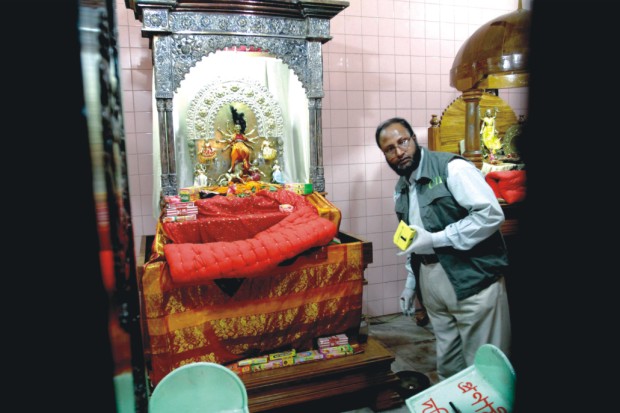|
Crime
No Respite from Crime
Farhana Urmee

Around 200 tolas of gold ornament and Tk 4.5 lakh in cash were stolen from Dhakeshwari Mandir on January 8. Photo: Shawkat Jamil
One of the most tragic and bizarre beginnings of the year was the killing of a visually impaired person in the city's Mirpur area on January 1, 2011. He was allegedly murdered by his rivals. Khalilur Rahman, the person who had already been deprived of sight, also got deprived of the right to a normal death after he was fatally wounded when unidentified attackers shot him.
The brutal deaths of a mother and son whose bodies were discovered in their home on January 9 is a stark reminder of the deterioration of the law and order situation despite the apparent vigilance of Police and Rab.
Newspapers reported 15 murders taking place in the first 10 days of January. Apart from the common people who hardly get additional protection or guarantee of justice, felony has found it's way at the doors of even those in the circles of power. The recent robbery at a lawmaker's house has made security for the ordinary person, an even more farfetched dream. Robbers broke into two flats in the city's Pallabi area, one of which belongs to ruling party lawmaker Shahida Tarekh Dipti. They got away with 86 tolas of gold and around Tk 6 lakh cash.
After such a daring robbery in the city, an apartment dweller Shibli Shahrier who lives alone at his flat in the Mirpur area that is adjacent to Pallabi says, “The whole situation in the society is getting so chaotic and uncertain that one cannot trust anybody. Further one cannot have the confidence that he or she would get justice.”
Interestingly, whatever the criminal offence is - murder, robbery or rape, the law enforcers are left with no clue in most cases making the justice delayed and ultimately, denied. Advocate Sultana Kamal, Executive Director of Ain O Salish Kendra, a human rights organisation that observes crime as part of society says that in every society some wrongdoers keep searching for opportunities to commit crime. “If the perpetrator sees that the misdeeds are going unpunished they will go on committing the crime,” says Sulatana Kamal.
Moreover, when the administration is in constant denial about the deteriorated state of law and order with the intention of establishing that 'everything is under control', criminals get encouraged, she says. “The law enforcers must have respect for their own accountability, and perform their duties with no other obligation. Often the perpetrators and accused get rid of the allegations as political patronisation is facilitated for them, and when politicians protect their supporters after they have committed crimes, a culture of impunity is likely to be established. Thus stability in law and order deteriorates,” Sultana Kamal says.
 |
Widow of Fazlul Huq, general secretary of Awami League
ward-41 unit of the capital's Agargaon.
Photo: Anisur Rahman |
Dhaka University Professor of Law Asif Nazrul draws some reasons behind the recent decline in security. A sense of impunity could evolve among the criminals as a number of cases have been withdrawn in recent days by terming them politically motivated to harass the accused, which allowed a number of criminals to get released from jail and get involved in crimes once again, he says. Criminals should be judged by the track of criminal records and not according to their political affiliations, he says.
Overlooking the crimes that are taking place for the sake of keeping things under control and protecting some people who have the patronage of vested interest groups is as bad as committing the criminal offence. The administration needs to recognise the actual situation to ensure proper punishment to the criminals. Sultana Kamal adds, “The general populace have a kind of responsibility as well in bringing back peace and order in the society by having the courage to speak out against wrong and in establishing the truth.”
Referring to an example of a thief who got bail from court 63 times Asif Nazrul says, “In our court system it is very easy to get bail for a criminal that makes the whole society vulnerable to crime. Again lack of employment among the youth creates a sort of frustration and encourages them to commit crime for trifling reasons.” There should be some specific steps to improve the law and order situation instead of having mere political commitment on it. Some exemplary steps to punish the perpetrators even if they are influential can prove as a bold step from the government's end, Asif Nazrul observes.
“Police should be given absolute independence from political influence and be allowed to work objectively. Police patrolling, moreover, must be enhanced to resist pocket-sized crime in certain areas of the city,” Nazrul observes.
Copyright
(R) thedailystar.net 2010 |
